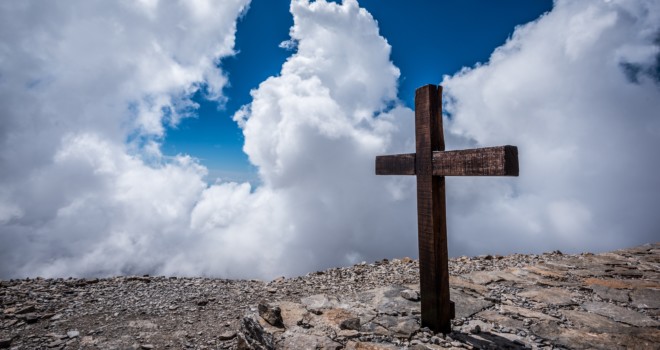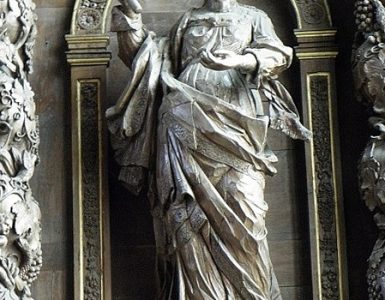Venerable Fulton Sheen made a commitment to spend a Holy Hour of prayer before the Blessed Sacrament every single day of his life as a seminarian, priest, and bishop. His faithfulness to this resolution, despite his hectic duties as a bishop, made him one of the most impactful bishops in the history of the Church in America and one whose messages remain relevant today.
St. Teresa of Calcutta persevered faithfully in her daily prayer despite the lack of the sensible presence of God during her prayer. She still continued to joyfully serve the poorest of the poor and to radiate hope to many people. Today she has her Missionaries of Charity sisters in virtually all the countries of the world.
These examples, and many others, prove that we serve as channels of divine power and consolation to our world when we are ready to make constant sacrifices to belong to God completely and to follow Jesus faithfully to the very end. In making these sacrifices, we are ready to freely let go of that which is wholesome and good in itself for the sake of something higher, bearing in mind that there is nothing higher than belonging to God completely and following Christ faithfully.
It is this spirit of constant sacrifices out of love for Christ that dispose us to receive the inner peace and strength of Jesus as attested by St. Paul, “For as we share abundantly in the sufferings of Christ, so through Christ do we share abundantly in His consolation. If we are afflicted, it is for your comfort and salvation.” (2Cor 1:5,6) Jesus Christ Himself consoles and strengthens us and others through us as we freely make sacrifices so as to belong to Him completely and follow Him more faithfully.
The Gospel tells us that “great crowds were following Jesus.” Most probably they sought to follow Him without this indispensable readiness for constant sacrifice. More than being followed by “great crowds,” Jesus desires that we follow Him with large hearts, that we be always ready to sacrifice even the natural family bonds so as to be His faithful companions, “If anyone comes to me without hating his father and mother, wife and children, brothers and sisters, and even his own life, he cannot be my disciple.”
Jesus uses the word “hate” to mean that, as His disciples, the ultimate aim of our lives cannot be to please ourselves or others. Because “we have only one Master, the Christ,”(Mt 23:10) we must seek to please Christ ultimately, even if it means not meeting our expectations or those of our loved ones. Behind every suffering that we face is a divine invitation to sacrifice something to please God alone, “Whoever does not carry His own cross and follow after me cannot be my disciple.”
We are to “sit down and count the cost first,” reflecting on whether we are ready for the constant sacrifices that Christian discipleship demands from us. Since we can never envisage what following Jesus Christ is going to entail or what sacrifices He will ask us to make in the future, our honest self-evaluation must lead to our freely “renouncing all our possessions” if we are going to be His faithful disciples to the very end.
Jesus’ earthly life was one continuous act of sacrifice from the crib to the tomb. He, “in whom dwells the fullness of divinity,”(Col 2:9) did not seek to please Himself but the Father, “I always do what is pleasing to Him.”(Jn 8:29) He who had “more than twelve legions of Angels” at His ready disposal to rescue Him from His captors in Gethsemane chose rather to surrender because He wanted to please the Father, “Your will be done.”(Mt 26:53,39) It was through this constant sacrifice that He brought this divine power and consolation into the world.
So we need frequent encounters in our world today where we can be in communion with the person of Christ as well as participate in His life-giving sacrifice. The Catechism points to the Eucharist as the divinely ordained locus of such encounters, “In the Eucharist the sacrifice of Christ becomes the sacrifice of His Body.”(CCC 1368) When we unite the painful situations of our lives to our Eucharistic Savior, we draw from His own sacrifice the grace to sacrifice all so as to please God, belong to Him completely above all things, follow Him faithfully, and bring divine power and hope into the Church and the world.
Many of us are trying to follow Christ today without cultivating a spirit of sacrifice. We shy away from anything that threatens our comfort and security and become “enemies of the cross of Christ.”(Phil 3:18) We only give ourselves to God and others as long as we do not experience pain or hurt.
Though Jesus offers us this spirit of sacrifice through the Eucharist, a recent survey show that many of us deny the Real Presence in the Eucharist and thus live without participating in the one eternal sacrifice of Christ made present on our altars. We strive to make sacrifices on our strength, and we end up frustrated and angry at our efforts and results.
On a much deeper level, some believe in the Real Presence but approach the Eucharist as only a meal and not a sacrifice. Pope Emeritus Benedict XVI recently linked the Church’s sexual abuse scandals to this attitude of reducing the Mass to a mere ceremonial gesture. He said, “The way people often receive the Holy Sacrament in communion as a matter of course shows that many see communion as a purely ceremonial gesture.”
When we fail to be grounded in our faith in the Real Presence in the Eucharist, when we ignore the sacrificial nature of the Mass and deny its ability to bring us into the life-giving sacrifice of Christ, we lack inner strength and hope for the journey and we fail to bring this strength and hope to others. We lack the power to endure the trials in our vocations in life. This explains the widespread loss of faith in our times, broken vows and promises in marriages, priesthood, and religious life, and the spread of evil in the Church today as evident in the painful clergy sexual abuse scandals.
We must be sure about this: Jesus did not come into this world to please us but to bring us to make the necessary sacrifices to belong to the Father and please Him alone. He did not please Himself too though He had the power to do so. He did not even live to please Mary, His Mother. When He was lost in the temple for three days, she asked Him why His behavior did not meet her expectations of Him, “Son, why have you treated us so? Behold your father and I have been searching for you anxiously.” Jesus brought her to see that it was neither about her nor St. Joseph but about the Heavenly Father, “Did you not know that I had to be about my Father’s business.” (Lk 2:47,49) Mary responded completely to His invitation and willingly belonged to Him completely and followed Him all the way to Calvary when all the others abandoned Him. At Calvary Mary would freely consent to the sacrifice of her one and only son on the cross for the greater good of our belonging to God and following Him faithfully. She remains for us a model and help in making those sacrifices constantly.
The grace of Jesus that we receive in today’s Eucharist was won for us on Calvary and it is not ultimately meant for us to please ourselves or others. Divine grace we receive will surely be accompanied by many opportunities for sacrifices in our lives, moments for us to put self and others aside to please God first and foremost. These will be painful for sure. But by this grace from His sacrifice, we can embrace these sacrifices for Him who sacrificed His life for us. This is the only way that we can experience and bring His power and consolation to our hurting world now and get to be completely His forever and ever. Amen.
Glory to Jesus!!! Honor to Mary!!!












